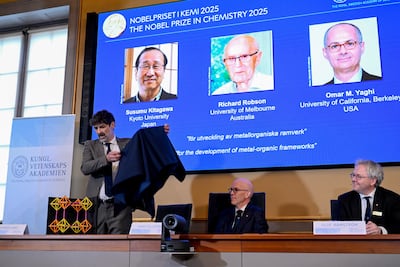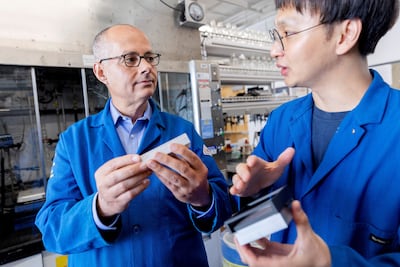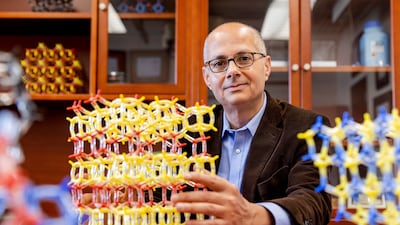A scientist who was born to a Palestinian refugee family in Jordan has been named a joint winner of the Nobel Prize for Chemistry.
Omar Yaghi shares the prize with Susumu Kitagawa and Richard Robson for their work on molecular constructions that could help solve “some of the challenges” the world faces, the award-giving body said.
They worked to create metal-organic frameworks with large spaces through which gases and other chemicals can flow. They can be utilised to harvest water from desert air, capture carbon dioxide and store toxic gases.
Mr Yaghi's research group succeeded in extracting water from desert air in Arizona.
"The beauty of chemistry is that if you learn how to control matter on the atomic and molecular level, well, the potential is great," he said after the prize was announced.
"We opened a gold mine in that way and the field grew," he said.
My Yaghi grew up knowing the struggles of a scarcity of water. As a child in Amman, he was tasked with collecting water for the family. It was only available once every two weeks, within a four-hour window.
“You store as much water as you can within that four hours and that’s the water you would use for those two weeks. If you ran out of water, you had to find a different source. So I grew up really appreciating the stress caused by water. It affects all aspects of life," he told a documentary.
His inventions have focused on transforming air into drinking water as a “cyclable resource”.
The 124-year-old prize is awarded by the Royal Swedish Academy of Sciences and the winners share 11 million Swedish crowns ($1.2 million), as well as the fame of winning arguably the world's most prestigious science award.
“They have found ways to create materials, entirely novel materials, with large cavities on their inside which can be seen almost like rooms in a hotel, so that guest molecules can enter and also exit again from the same material,” Heiner Linke, chairman of the Nobel Committee for Chemistry, said of this year's winners.
“A small amount of such material can be almost like Hermione's handbag in Harry Potter. It can store huge amounts of gas in a tiny volume,” he told a press conference.

Commentators have for years suggested Mr Yaghi as a strong contender for the prize.
He is a professor at the University of California, Berkeley, in the US. Mr Kitagawa is a professor at Kyoto University in Japan, while Mr Robson is a professor at the University of Melbourne, Australia.
Mr Yaghi is an elected member of the US National Academy of Sciences and in January became the seventh president of the World Cultural Council, which promotes cultural values, goodwill and philanthropy.
Family life
He was born in Amman to a refugee family originally from Palestine. He has spoken about his upbringing in a single room he shared with his eight siblings, parents and several cows. At 15, he moved to the US to study, where he excelled in chemistry.
"I grew up in a very humble home. We were a dozen of us in one small room, sharing it with the cattle that we used to raise," Mr Yaghi told the Nobel Foundation in an interview after learning he had won the prestigious prize.
“Smart people, talented people, skilled people exist everywhere. That's why we really should focus on unleashing their potential through providing them with opportunity.”
He has set up research centres around the world, including in Jordan and Saudi Arabia, and was granted Saudi citizenship in 2021 through a royal decree from King Salman.
Earlier this year, he described how his family had to live without water or electricity, and survived without a lot of money, yet always focused on education because it has the "power to transform lives".
Collecting a Great Arab Minds award from Sheikh Mohammed bin Rashid, Vice President and Ruler of Dubai, in January, he said he was "captivated by the beauty of molecules" from the age of 10.
"My advice to ambitious young people is that science doesn’t care about your background, financial status, or social circumstances," he told The National at the event.
In a social media post on Wednesday, Sheikh Mohammed wrote: “We congratulate Professor Yaghi, and before that, we congratulate the Arab world for these minds that we take pride in among nations.
“The Arab world is full of geniuses and rich in minds. Our message is to restore confidence in ourselves, and confidence in our youth, and confidence in our scientists.”
King Abdullah of Jordan said he was "proud" of Mr Yaghi. "His achievement is Jordan's pride, and adds to Jordanians' record of excellence in all fields, at home and abroad, proving they can make a difference wherever they are", he wrote on X.

Inspiration
Mr Yaghi's work involved studying how moths were able to harvest water and store it for use at high temperatures. He experimented with moths in a transparent box in the Arizona desert.
“It was powerful for me to see that you can make water in the desert with just the material, the moth and the ambient sunlight.” It meant that “everyone in the world” could potentially have their own water-producing device.
Mr Yaghi's colleague Zihui Zhou previously told The National about another element of their joint work discovering a highly porous material that can capture and store carbon dioxide more efficiently, which could put humanity on the path to negative carbon emissions.
“Direct air capture is like a giant vacuum cleaner that removes CO2 out of the air, captures it, and stores,” Mr Zhou said. “It helps reduce the overall amount of CO2 in the atmosphere, which is key for tackling climate change.”
The award-giving body said on Wednesday: “Through the development of metal-organic frameworks, the laureates have provided chemists with new opportunities for solving some of the challenges we face.”
They have “enormous potential, bringing previously unforeseen opportunities for custom-made materials with new functions”, Heiner Linke, chairman of the Nobel Committee for Chemistry, said.
The Chemistry Nobel was the third prize announced in this year's set of awards, in keeping with tradition, following those for medicine and physics announced earlier this week.
On Tuesday, Briton John Clarke, Frenchman Michel Devoret and American John Martinis were honoured for their work putting quantum mechanics into action – enabling the development of all kinds of digital technology.
On Monday, the Nobel Prize in Medicine was awarded to a US-Japanese trio for research into the human immune system. Mary Brunkow and Fred Ramsdell, of the US, and Japan's Shimon Sakaguchi were recognised by the Nobel jury for identifying immunological “security guards”.
On Thursday, the literature prize will be handed out. The Nobel Peace Prize will follow on Friday.
Established in the will of Swedish inventor and businessman Alfred Nobel, the prizes for achievements in science, literature and peace have been awarded since 1901, with a few interruptions mostly due to the world wars.
Nobel was a chemist and his developments in that field helped to build the wealth he amassed from his invention of dynamite in the 19th century. The economics prize is a later addition funded by the Swedish central bank.
Sometimes overshadowed by more famous laureates in the fields of physics, literature and peace, the chemistry awards have recognised many influential discoveries, such as nuclear fission, DNA sequencing techniques and yeast.
Last year's chemistry award went to US scientists David Baker and John Jumper, and Briton Demis Hassabis for work on decoding the structure of proteins and creating new ones, yielding advances in areas such as drug development.



